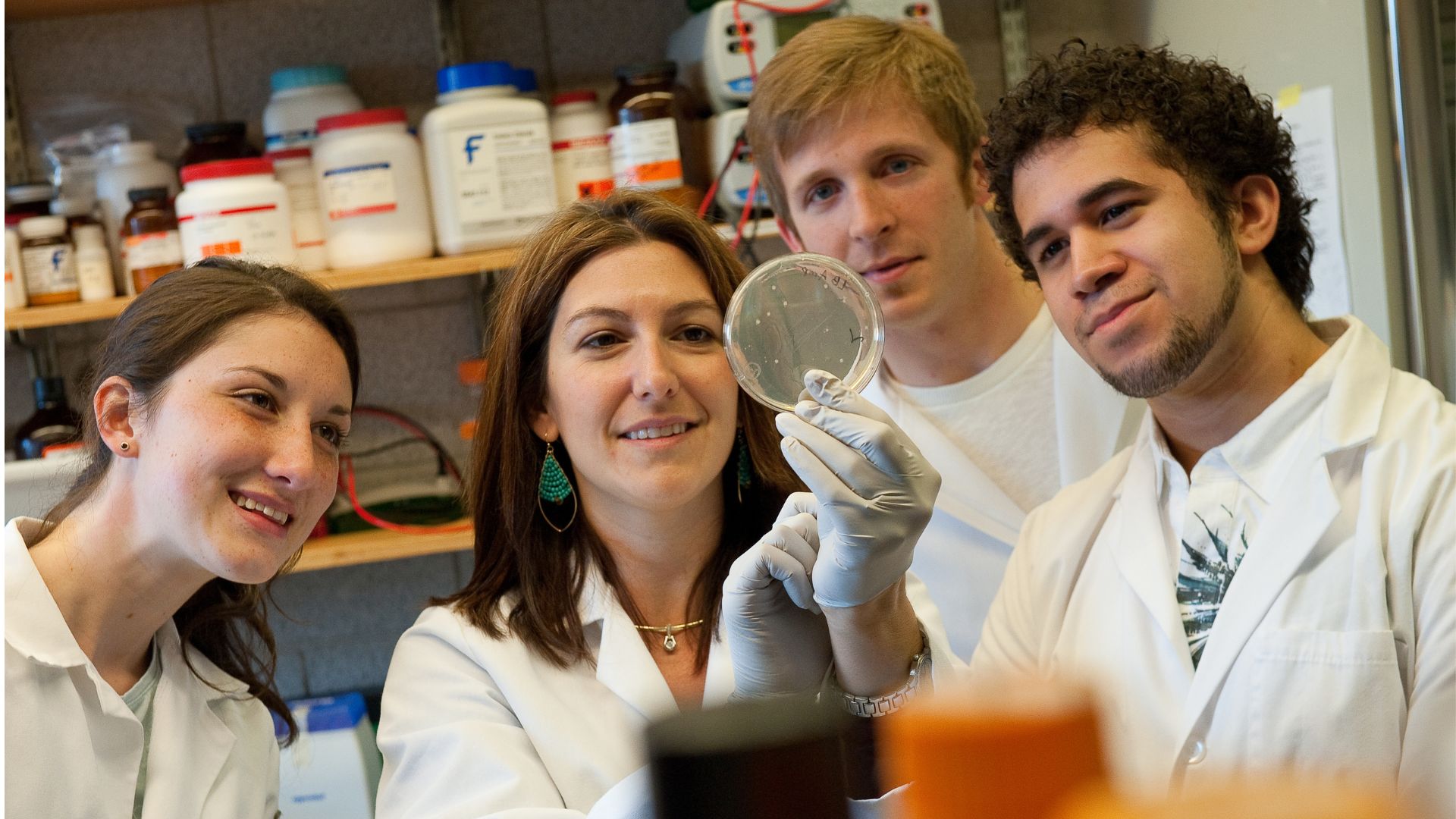If you have interest in medicine and science, and have a penchant for analysis, a degree in medical laboratory science might be a good fit for you.
July 2020

Medical laboratory science students at University of Vermont work closely with faculty members and engage in hands-on learning. Courtesy SALLY MCKAY/university of Vermont College of Nursing and Health Sciences
Medical laboratory science (MLS), an integral part of the health care system, is the profession that analyzes blood, tissues and other bodily specimens for the diagnosis, monitoring and treatment of diseases. “In today’s era of rapidly evolving medical research and technology, one can hardly imagine a health care system without the contributions of medical laboratory scientists,” says Eyal Amiel, assistant professor of medical laboratory science at the University of Vermont (UVM).
The scope of work covered by medical laboratory scientists is vast, ranging from detecting cancer cells and screening for diabetes to determining blood types and performing genetic testing. “It is estimated that approximately 70 percent of information that doctors use to diagnose and treat patients comes from the work of the clinical laboratory,” says Heather Eggleston, manager of academic services at the University of Washington’s Department of Laboratory Medicine.
Applicants to MLS programs at U.S. universities generally need to have completed prerequisite courses in biology, chemistry, human physiology and statistics. Some programs may have additional requirements, including a personal statement, recommendation form and an interview.
Many MLS programs offer scholarships. For instance, at the University of Washington, students can apply for several scholarships after they have been admitted to the major. “These scholarships are provided by generous endowments from former faculty, staff and MLS alumni,” says Eggleston. The University of Vermont offers funding to international students in the form of a merit scholarship based on academic performance. “The international merit scholarship goes up to $20,000 per year. If you are admitted to UVM, then you will be automatically considered for the merit scholarship; there is no separate application,” says Jeff Wakefield, associate director, News and Public Affairs, University of Vermont.
MLS programs at U.S. universities offer substantial hands-on experience that prepares graduates for future jobs. “Students in this major work closely with faculty members and engage in hands-on learning in the classroom, laboratory and clinical environment to develop critical thinking and technical skills,” says Amiel. “In UVM’s medical laboratory science program, students receive rigorous clinical training in areas such as clinical chemistry, immunology, hematology and microbiology, throughout the curriculum, in both classroom and laboratory settings.” The program culminates in a semester-long clinical placement where students work full-time in an operating clinical laboratory, getting to put all of their academic training into hands-on practice in the hospital setting.
During the first year of the program at the University of Washington, “junior MLS students are required to successfully complete lab courses in an MLS Foundations course, hematology, medical bacteriology, clinical chemistry, mycology, parasitology, clinical microbiology, urinalysis or body fluids, coagulation and transfusion medicine,” says Eggleston. “In addition to these lab courses, students get further hands-on training during the second or final year of the program in their clinical rotation courses” in a variety of hospital laboratories in the Seattle or Puget Sound region. “Each student will complete a clinical rotation in all of the disciplines in laboratory medicine: chemistry, hematology, microbiology, research and transfusion medicine, and a one-week rotation in molecular diagnostics,” she adds. The university organizes placements and scheduling based on students’ preferences and rotation availability at each affiliate site, where they are “responsible for completing case studies, weekly quizzes and preparing a presentation on a related topic. They take a final exam at the conclusion of each rotation,” says Eggleston.
Graduates of MLS programs go on to work at laboratories, children’s hospitals, cancer centers or emergency departments of medical centers. Students can also work on clinical and non-clinical research, “biotechnology, forensics, state crime labs, the CDC [Centers for Disease Control and Prevention], companies that develop and market testing instrumentation and equipment, teaching, IT positions in laboratory medicine or hospitals and with humanitarian organizations focused on health care,” says Eggleston.
“The medical laboratory science field has a consistently high demand for well-trained qualified workers. Whether assessing and addressing emerging public health issues, providing clinical testing and therapeutic treatments for infectious disease or discovering new mechanisms underlying cancer, our students are prepared to apply their knowledge in the world,” says Amiel. “The majority of students graduating from this program opt to pursue immediate careers as medical laboratory scientists in hospital clinical laboratories, and 100 percent of students who pursue this are successful in securing jobs in the clinical laboratory upon graduation.” This is echoed by Eggleston, who says that often 100 percent of the graduates of the University of Washington’s MLS program are employed within three months of graduation or sooner. “Many students will have job offers secured before they graduate and start their jobs immediately after graduation,” she adds.
For some students, a degree in MLS is a pathway to associated careers in the field of health care. As Amiel explains, “A number of students pursue the University of Vermont’s MLS program to obtain rigorous academic training in human-oriented biomedical science as preparation for medical school, physician’s assistant programs and graduate school programs including microbiology, virology, genomics and pathogenesis of immune-mediated or infectious disease.”
Natasa Milas is a freelance writer based in New York City.
COMMENTS